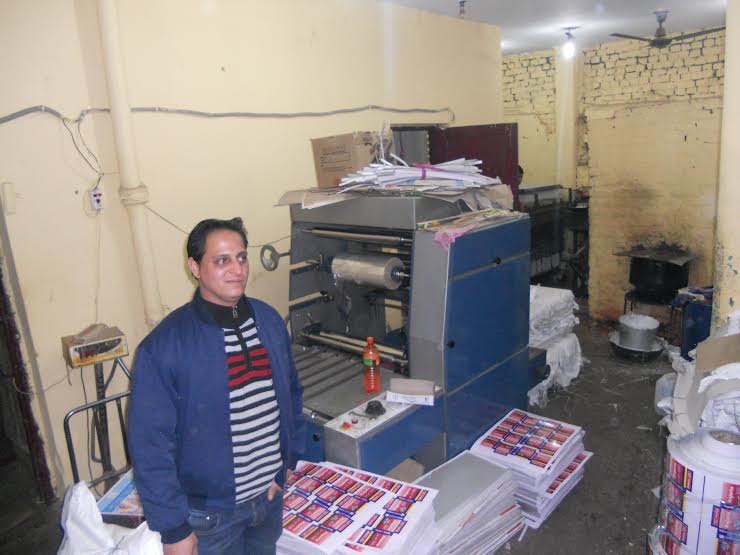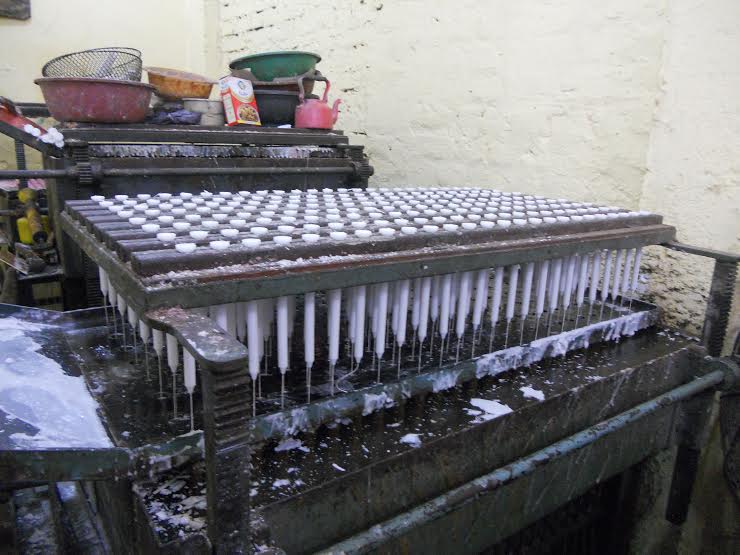After security situation squeezed the raw material for his father’s incense manufacturing, Ami Sharma availed a loan and converted part of his home into a cardboard printing press to keep the show going, reports R S Gull
When people assert that the security situation that erupted in 1990s impacted only militancy affected areas, they seem to be reducing the consequences. People living far away from strife-ridden belt of the state also paid a bit of the cost.
Take for instance, Kuldeep Sharma, a resident of Rehadi, in old Jammu Town. Since 1978, he inherited the family business of manufacturing Dhoop, one of the many incense items, that is part of the surging market. Incense burning remains a major part of the ritual prayers in India which is witnessing a boom, year after year.
“We were doing an impressive business and most of the manufacture was exported to other states,” Sharma said. “Most of the basic ingredients were coming from the high mountain peaks of Doda which was the key to our manufacture.”
After militancy started, the peaks became no-go areas. “People who were supplying us the herbs said they cannot access the areas and all of a sudden the raw material was missing,” Sharma said. “Then we started securing the necessary herbs from Himachal and other states but the quantum of fragrance was completely different.” Sharma said a sudden shift in the raw material led to the drop in sales and demand.
There were a number of such units operating in Jammu. Gradually all of them started closing the shutters. “I somehow managed to keep the show going but the income would not manage the affairs of the family going. It was gradually heading towards a complete halt.” And then things started changing again.
His son Amit had completed his graduation from the Jammu’s Punjab Technical University in 2009. He was searching for a job which was not available. He started exploring things and served with some printing facility in the town for some time. Jammu city has more than 50 printing presses which managed the cardboard printing and packaging. “I had a friend of many years who was in this business for more than 25 years,” Amit said. “I wanted to do this but lacked enough of resources to manage, because the kitty at home was empty and pressures for doing something were mounting.”
At that point of time, somehow, Amit landed in the office of EDI at railhead. Quickly he got a crash course to understand the nuances of the trade he was desperate to get in. He was one of the members of the first batch of Jammu entrepreneurs whom EDI trained. He availed the SKEWPY’s Seed Capital Fund that envisages funding part of the overall project free. His project, the cardboard printing unit cost Rs 12.26 lakh of which Rs 2.60 lakh was the Seed Capital share and rest was the mix of bank loan and personal equity.
Despite being the member of the first group, he was destined to miss the bus. Reason: a revenue clerk allegedly sat on his file and it took almost every influential person from the city to request him. Even EDI officers accompanied him to the clerk but the official took almost a full quarter in just processing the file to the Deputy Commissioner for issuing a mandatory certificate.
“I have two big days in my life which I will never forget,” Amit says. “The first when the clerk released the file and the second when the unit actually came up and started printing.” He says he had clear vision for creating his own niche in the market but lacked any way-out to manage the file from a particular table.
Within a few months, he purchased the machinery and quickly jumped into the business and started Shiv Shanker Offset Printing Press. “Right now, I have almost 35 major clients who purchase packaging from me,” Ami says. “More than 25 are from Kashmir alone and I have appointed an agent to mange my business.”
Now Amit purchases the raw material from Delhi and in a year, he requires nearly half a million rupees for purchasing cardboard alone. He has four employees and he works eight hours a day. “I pay them Rs 10,000 each and they are committed to the unit,” Amit says. “I have around 7% margins which is satisfying because it is just the start and volume is not quite huge.” He is now thinking of expanding a bit more to add a few more processes in his ground floor facility so that it improves the margins, help him appoint a few boys more and improve the overall business.
His father Kuldeep has not closed the Dhoop shop located outside the printing press. “I am fighting to keep the business going,” Sharma Sr said. “Earlier, we were managing the produce and getting the packaging from outside. Now there is some saving on the packaging too.” Sharma said he has slightly expanded the manufacturing base. “I am also earning but with Amit busy in the business, I am more satisfied than the days when he was hunting for a job.” He admitted the family underwent a positive change after the press started rolling out packaging for various bakeries in Srinagar. In the corner of the printing press, small section is converting into fragrant wax candles which are packaged for high end market. “The orders are quite a few but returns are better,” Amit says.
“We have Eid when Srinagar is fasting and then we have another Eid two months later,” Amit says. “The reason is simple: we work almost round the clock because the demand peaks on Eids and the marriage season in between.”

















